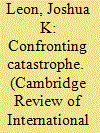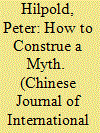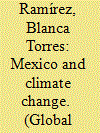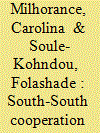| Srl | Item |
| 1 |
ID:
118875


|
|
|
| 2 |
ID:
108253


|
|
|
|
|
| Publication |
2011.
|
| Summary/Abstract |
Social environments played a powerful role in the institutional adaptations of the AIDS fighting agencies within the United Nations system. Since its AIDS apparatus has become operational, the UN has undertaken two major strategic shifts. The first shift saw the dissolution of the GPA, a small subunit of the WHO in favour of UNAIDS, a dedicated agency engaged in global advocacy. This shift involved a controversial bureaucratic process that led, finally, to a more human rights-based approach to the disease. The second shift saw an increased emphasis on ground-level efficiency. What caused these changes? Contributions in the rationalist tradition expect the UN to act as a multilateral goal-seeker looking to optimally address a major gap in global governance. A sociological framework sees normative changes within the UN as catalysts for change in its goals and structure. A synthesis of these traditions conceptualizes the UN's strategic shifts more clearly, capturing the interactive process between the organization and its strategic environment. UN agencies were forced to rationally adapt to changing conditions in prevailing AIDS norms.
|
|
|
|
|
|
|
|
|
|
|
|
|
|
|
|
| 3 |
ID:
170421


|
|
|
|
|
| Summary/Abstract |
In the 19th century neutrality was a highly appreciated concept. In the 20th century it widely lost relevance and in principle it should be incompatible with UN membership. However, also under the UN system, some States have opted for neutrality and it can be argued that there is still space for this status within the universal peace order. In fact, this peace order is far from perfect. There are several lacunae in the prohibition of the use of force and this concept is open to different interpretations. New threats, such as international terrorism, are emerging that could threaten the absolute prohibition of the use of force. It is contended here that neutrals could play an important role when it comes to finding an interpretation of this prohibition that best could reconcile the goals of peace and security with the overall—still imperfect—structure of the UN system. These questions are analysed with primary reference to Austrian neutrality which on the one hand seems obsolete but on the other is forcefully looking for a new meaning.
|
|
|
|
|
|
|
|
|
|
|
|
|
|
|
|
| 4 |
ID:
129043


|
|
|
|
|
| Publication |
2014.
|
| Summary/Abstract |
During the first decade of this century, Mexico showed increasing activism on climate change. It strongly supported working within the United Nations system, convinced that this is the best path to confront the problem. It also participated in smaller, informal forums dealing with this vital but divisive issue. Mexico was more successful in its efforts to contribute in rebuilding the capacity of the multilateral system at this crucial moment than it was in its attempts to become a bridge between developed and developing countries, while some of the latter saw it leaning far toward the developed world.
|
|
|
|
|
|
|
|
|
|
|
|
|
|
|
|
| 5 |
ID:
154715


|
|
|
|
|
| Summary/Abstract |
Using the examples of the UN Development Programme and the UN Food and Agriculture Organization, this article aims to analyze how the role of international organizations (IOs) is being changed through the incorporation of South-South cooperation (SSC) narratives and practices into their activities. Despite increased interest in the role of SSC in global governance, few empirical researchers get inside these organizations to see and analyze how this form of cooperation impacts IOs and how the latter adapt to these changes. Based on fieldwork and participant observation, the article presents some results on the mechanisms of IOs in their efforts to permanently readapt to the international environment and, at the same time, participate in the configuration of the international scene. The main argument is that the revival of SSC by rising powers has offered them an opportunity to establish individual and collective strategic partnerships with IOs. In doing so, these powers used SSC modalities to engage several redirections of IOs' governance to lift SSC to the top of the international agenda. IOs first resisted these changes and then readapted by using these strategic partnerships as a means to reaffirm their role in the international system's hierarchy as main institutions promoting SSC.
|
|
|
|
|
|
|
|
|
|
|
|
|
|
|
|